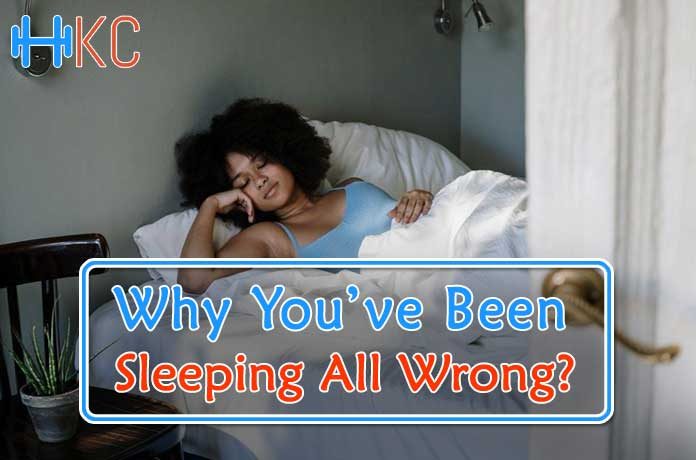Why You’ve Been Sleeping All Wrong?
To be healthier, wake up fresh, restored and calm it’s essential to stress the importance of both sleep quantity – the number of hours you rest each night – as well as quality, which indicates how resting your sleep was. Lack of sleep or poor sleeping quality can cause you to feel groggy the next day and may even be linked to an increased risk of Alzheimer’s disease.
However, determining your sleep quality is less straightforward than counting the hours of sleep you get. But sometimes it’s impetuous to simply tell someone to sleep enough hours. Sometimes in life, we’re just dealt into circumstances where compromising the amount of sleep we get becomes a necessity. And, what this entails is the simple fact that we must maximize on the other foundational bedrock of proper sleep: quality.
Why are you sleeping so badly?
Modern life is overflowed by factors that aren’t favorable to a good night’s rest. But healthy mattresses and recent findings in sleep science can help us tackle these problems.
A recent report found that current smokers, for instance, sleep, on average, 5 minutes less per day than non-smokers, while those with kids over 18 sleep 4.2 minutes more per day than those with children.
On a night by night level, a study found that 42% of people said their partner snoring was the main cause for poor sleeping (while in the U.S, a quarter of couples now say they sleep way better alone than with their partner).
Besides snoring, 55% said that getting up to go to the bathroom was what troubled their sleep quality. An uncomfortable, old bed was the next common issue. 23% said that a partner using a mobile device in bed was what stopped them from resting.
Sleep – an emerging casualty of the COVID-19 crisis:
Too many sleepless nights exacerbate both mental and physical health problems, but a few simple corrections to our already remodelled routines may resolve our bedtime issues and send us to sleep faster than we think.
Calling the present situation, the “new normalcy” or a “perfect storm of sleep problems”, those battling sleepless nights indicated that disrupted daily routines worsen the sleep-draining stress of the virus. According to the American Academy of Sleep Medicine, nearly 30% to 35% of the population battles short-term, or acute insomnia.
Defined in the Statistical Manual of Mental Health as difficulty going to sleep, staying asleep, or waking too early, this lack of rest is prompted by stress and any event that may alter the quality of our life – some call it the manifestation of the “fight or flight” response to danger – and differs entirely from sleep issues caused by hectic routines.
Crucial Sleep Solutions:
The ideal sleeping position: on your side
The only sleeping position that prevents snoring and promotes the lymphatic system is a lateral position or sleeping on your side. For example, the gravitational pressure in a sideways sleeping position allows your tongue to fall in the area of your cheeks – maintain the air free of any obstruction. Next, your lymphatic system is allowed to run its due course, unharmed, and undisturbed.
However, a large part of the problem lies in maintaining the position. Considering that we used to change our sleeping positions an average of 35 times per night, maintaining a sideways position seems like a wiry horse to tame. But our creativity can help us tackle these problems. For instance, one wife told the story of curing her partner of snoring by attaching a rubber ball into a pocket on the back of his blouse, hindering him from sustaining a supine (on the back) position for too long.
Alternate solution: get rid of pillows?
The problem has been literally resting under our noses. Pillows make us too comfortable to realize we’ve been sleeping in the wrong posture all this time.
Without a pillow, we easily transition into a lateral side as it renders other options quite disagreeable. If you don’t believe it, try it at home tonight. Try to hide your pillows and then sleep without them. Most likely, you’ll end up turning your arm into an improvised pillow, but that’s kind of where you’re trying to get, sleeping on your side for a healthier future.
Kill the screens.
More likely, you’re holding in your hands a physical trigger for your insomnia. Your favorite screen – even the television is bad for sleep as they emit blue light, which can hinder your body’s natural secretion of melatonin, a hormone that regulates the sleep-wake cycle.
Pretty much like a drug, light promotes wakefulness, although many adults still find themselves in bed cuddling their laptops. Sleep experts encourage people to put away all screens in the evening – as, for kids, experts encourage parents to create a bedroom for their kids that is dark and quiet. For adults who can’t hold the screen at night, adjust your display to the night shift, which brings the colors of your display to a warmer spectrum. Experts also advise us to spend as much time in the daylight as possible and dimming the lights in your home in the evening to generate healthier sleep hygiene.
What’s more, our screens come-in-hand with being sedentary, so being more physically active can also promote healthier sleep. Sleep experts suggest parents encourage their children to get at least 60 minutes of physical activity every day for better sleep habits.
Lay off the booze.
Perhaps you have a cocktail in your hand instead of a busy screen. And it’s quite understandable – we drink in good time and bad, yet evidence suggests that consumption has soared since the onset of the pandemic. Alcohol robs our bodies of crucial REM and triggers a “rebound effect,” keeping you up in the wee hours after its “dizzy” effects have worn off.
So, I should never drink again if I want to sleep better? Not necessarily. You can try to give up booze for a week and see if your sleep improves. For some people, one or two beers don’t affect their sleep very much, yet for others – especially we’re a little more likely to wake up and experience more stress – that’s enough to disrupt their sleep.
If alcohol is causing your sleep problems – it may also be causing you to consume another insomnia culprit the next day. Caffeine comes in many forms and, like alcohol, affects us differently. If you drink too much and you can’t rest, then cut back. Parents who kids cannot rest should also check the labels on what they’re drinking. Chocolate and sodas contain caffeine, as do some sports drinks.
Pretty much everybody should quit consuming any caffeine or alcohol about five hours before they go to bed – though some people may be better off with 10 hours, according to experts.
In some insomnia cases, supplements and prescription drugs – especially melatonin for children – may be effective, but it’s imperative to talk to a doctor before going that route.
Whether you’re waking up in the middle of the night, suddenly turning and tossing, and bedtime, the first step towards improving your sleep health is to figure out what’s triggering those problems. Once you do that, you can take the necessary action to prevent it from becoming a clinical sleep disorder.
















